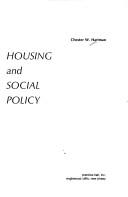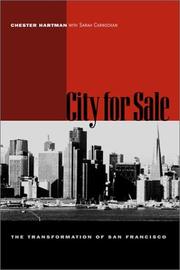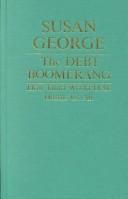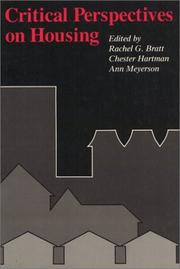| Listing 1 - 9 of 9 |
Sort by
|
Book
ISBN: 9780739191729 0739191721 9780739191712 0739191713 Year: 2014 Publisher: Lanham
Abstract | Keywords | Export | Availability | Bookmark
 Loading...
Loading...Choose an application
- Reference Manager
- EndNote
- RefWorks (Direct export to RefWorks)

ISBN: 0133949990 Year: 1975 Publisher: Englewood Cliffs Prentice-Hall
Abstract | Keywords | Export | Availability | Bookmark
 Loading...
Loading...Choose an application
- Reference Manager
- EndNote
- RefWorks (Direct export to RefWorks)

ISBN: 1282758705 9786612758706 0520914902 1597345431 9781597345439 9780520914902 9780520086050 0520086058 0520086058 Year: 2002 Publisher: Berkeley University of California Press
Abstract | Keywords | Export | Availability | Bookmark
 Loading...
Loading...Choose an application
- Reference Manager
- EndNote
- RefWorks (Direct export to RefWorks)
San Francisco is perhaps the most exhilarating of all American cities--its beauty, cultural and political avant-gardism, and history are legendary, while its idiosyncrasies make front-page news. In this revised edition of his highly regarded study of San Francisco's economic and political development since the mid-1950s, Chester Hartman gives a detailed account of how the city has been transformed by the expansion--outward and upward--of its downtown. His story is fueled by a wide range of players and an astonishing array of events, from police storming the International Hotel to citizens forcing the midair termination of a freeway. Throughout, Hartman raises a troubling question: can San Francisco's unique qualities survive the changes that have altered the city's skyline, neighborhoods, and economy? Hartman was directly involved in many of the events he chronicles and thus had access to sources that might otherwise have been unavailable. A former activist with the National Housing Law Project, San Franciscans for Affordable Housing, and other neighborhood organizations, he explains how corporate San Francisco obtained the necessary cooperation of city and federal governments in undertaking massive redevelopment. He illustrates the rationale that produced BART, a subway system that serves upper-income suburbs but few of the city's poor neighborhoods, and cites the environmental effects of unrestrained highrise development, such as powerful wind tunnels and lack of sunshine. In describing the struggle to keep housing affordable in San Francisco and the seemingly intractable problem of homelessness, Hartman reveals the human face of the city's economic transformation.
City planning --- Urban renewal --- Cities and towns --- Civic planning --- Land use, Urban --- Model cities --- Redevelopment, Urban --- Slum clearance --- Town planning --- Urban design --- Urban development --- Urban planning --- Land use --- Planning --- Art, Municipal --- Civic improvement --- Regional planning --- Urban policy --- Renewal, Urban --- Urban redevelopment --- Urban renewal projects --- Government policy --- Management --- San Francisco (Calif.) --- San Francisco County (Calif.) --- San Francisco --- San Francisco City & County (Calif.) --- San Francisco City and County (Calif.) --- City & County of San Francisco (Calif.) --- City and County of San Francisco (Calif.) --- Saint Francisco (Calif.) --- Yerba Buena (Calif.) --- Urban renewal -- California -- San Francisco.. --- City planning -- California -- San Francisco.. --- San Francisco (Calif.). --- affordable housing. --- american cities. --- american studies. --- bart. --- bay area. --- california. --- city life. --- city planning. --- city politics. --- city. --- downtown. --- economy. --- environmental effects. --- environmentalism. --- freeway. --- highrise. --- homelessness. --- housing development. --- housing. --- international hotel. --- national housing law project. --- nonfiction. --- political economy. --- poverty. --- redevelopment. --- san francisco. --- skyline. --- social issues. --- tenants rights. --- urban development. --- urban experience. --- urban planning. --- urban. --- urbanism. --- wind tunnels.
Book
Abstract | Keywords | Export | Availability | Bookmark
 Loading...
Loading...Choose an application
- Reference Manager
- EndNote
- RefWorks (Direct export to RefWorks)
America's Growing Inequality presents the links between racism and poverty in the United States, highlighting the work of social justice organizations to facilitate an end to their presence in society. The facts, analyses, and policy proposals that comprise this book will inform scholars and students in a range of disciplines including sociology, social work, urban planning, and economics.
Equality --- Social stratification --- Poverty

ISBN: 0745306381 0745306373 Year: 1992 Publisher: London Concord, Mass. Amsterdam Pluto Press TNI
Abstract | Keywords | Export | Availability | Bookmark
 Loading...
Loading...Choose an application
- Reference Manager
- EndNote
- RefWorks (Direct export to RefWorks)
Book
ISBN: 1613320523 9781613320525 9781613320143 1613320140 1306438322 9781306438322 9781613320136 1613320132 9781613320518 1613320515 Year: 2013 Publisher: New York, NY
Abstract | Keywords | Export | Availability | Bookmark
 Loading...
Loading...Choose an application
- Reference Manager
- EndNote
- RefWorks (Direct export to RefWorks)
Housing --- Housing policy --- Mortgage loans --- Economic policy --- Occupy movement --- Protest movements --- Economic nationalism --- Economic planning --- National planning --- State planning --- Economics --- Planning --- National security --- Social policy --- Citizen participation. --- Citizen participation --- E-books

ISBN: 041595486X 0415954878 Year: 2006 Publisher: New York : Routledge,
Abstract | Keywords | Export | Availability | Bookmark
 Loading...
Loading...Choose an application
- Reference Manager
- EndNote
- RefWorks (Direct export to RefWorks)
'There is No Such Thing as a Natural Disaster' is the first critical scholarly book on the catastrophic impact of Hurricane Katrina on New Orleans. The disaster will go down in record as one of the worst in American history, not least because of the government's generally inept and cavalier response. But it's also a huge story for other obvious reasons. Firstly, the impact of the hurricane was uneven, and race and class (and tied to this, poverty) were deeply implicated in the unevenness. It was not by accident that the poorest and blackest neighborhoods were the ones that were buried under water. Secondly, the response underscored the impoverishment of social policy (or what passes for it) in both George W. Bush's America and more specifically the Republican-dominated South. Thirdly, New Orleans is not just any place - it's a great American city with a rich and unique history. People care about the place and what happens there. Fourthly, what happened and what will happen there can tell us a great deal about the state of urban and regional planning in contemporary America. The book, edited by two eminent scholars/authors, gathers together ten excellent scholars to put forth a multifaceted portrait of the social implications of the disaster. And the disaster was primarily social in nature, as the title reminds us. The book covers the response to the disaster and the roles that race and class played, its impact on housing, the historical context of urban disasters in America, the nature of contemporary metropolitan planning, what the hurricane has taught us about planning, the role of the vast prison system in all of this, the future of economic development, the roles of business and the media, and how the hurricane disproportionately impacted female headed households. In total, it offers a critical and comprehensive social portrait of the disaster's catastrophic effects on New Orleans.
Disaster relief --- Human services --- Hurricane Katrina, 2005 --- Hurricane Rita, 2005 --- Marginality, Social --- People with social disabilities --- Social aspects --- Social aspects. --- Government policy

ISBN: 0877223955 0877223963 Year: 1986 Publisher: Philadelphia : Temple University Press,
Abstract | Keywords | Export | Availability | Bookmark
 Loading...
Loading...Choose an application
- Reference Manager
- EndNote
- RefWorks (Direct export to RefWorks)
Housing --- Public housing --- Working class
Book
ISBN: 128109367X 9786611093679 1592134335 Year: 2006 Publisher: Philadelphia, PA : Temple University Press,
Abstract | Keywords | Export | Availability | Bookmark
 Loading...
Loading...Choose an application
- Reference Manager
- EndNote
- RefWorks (Direct export to RefWorks)
In the 1949 Housing Act, Congress declared ""a decent home and a suitable living environment for every American family"" our national housing goal. Today, little more than half a century later, upwards of 100 million people in the United States live in housing that is physically inadequate, unsafe, overcrowded, or unaffordable. The contributors to A Right to Housing consider the key issues related to America's housing crisis, including income inequality and insecurity, segregation and discrimination, the rights of the elderly, as well as legislative and judicial responses
Housing policy --- Right to housing --- Housing --- Equality --- Social justice --- Finance.
| Listing 1 - 9 of 9 |
Sort by
|

 Search
Search Feedback
Feedback About UniCat
About UniCat  Help
Help News
News